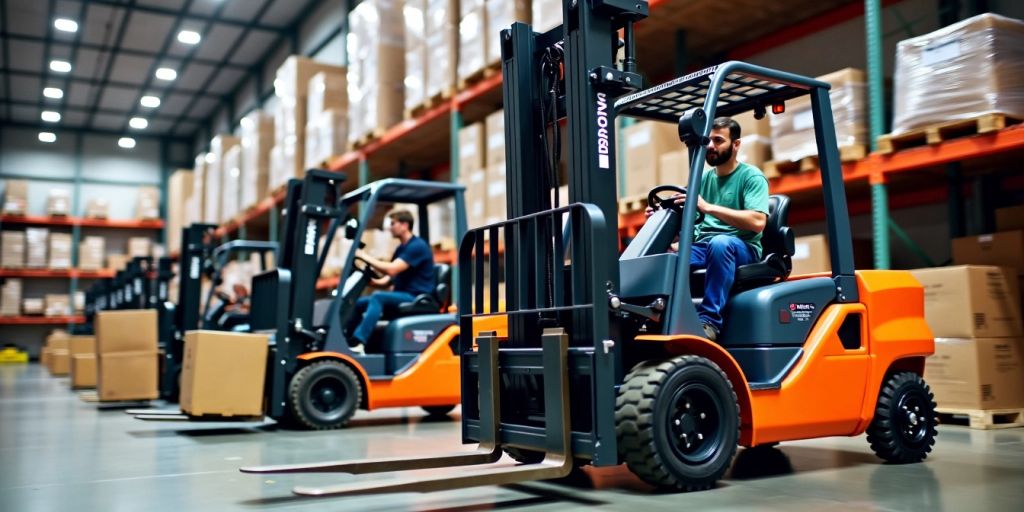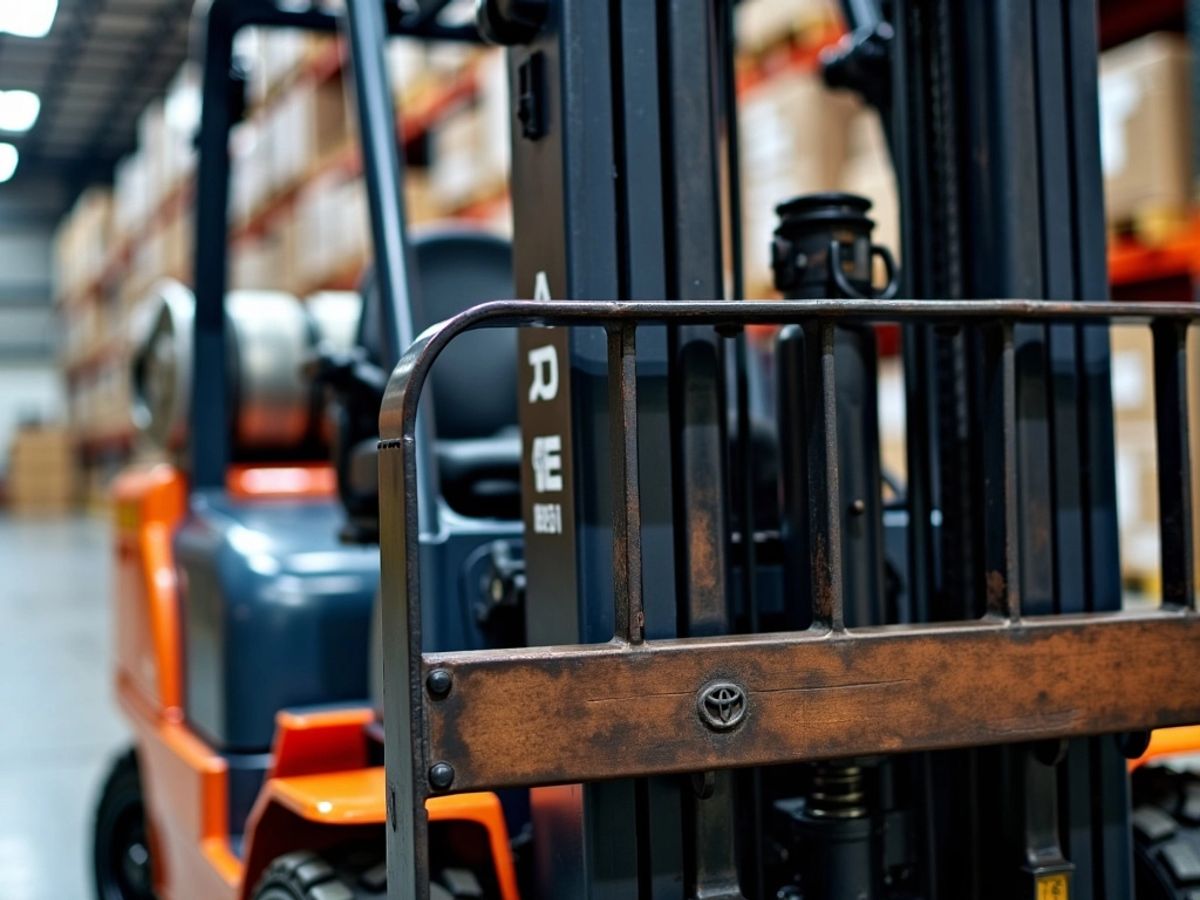Forklifts are absolutely essential tools in a wide variety of industries, including construction, warehousing, and manufacturing, but they can pose significant dangers if not properly maintained and operated with care. Regular professional inspections are crucial to ensure that these powerful machines are safe to operate and comply with all safety regulations. This article will thoroughly explain why you should invest in professional forklift inspections, detailing the numerous benefits they bring, such as enhanced safety, reduced liability, and increased operational efficiency.
Key Takeaways
- Regular inspections help prevent accidents and injuries.
- Professional technicians have the expertise to spot issues that might be missed.
- Keeping up with inspections ensures compliance with legal standards.
- Routine checks can extend the lifespan of your forklift.
- Investing in inspections can save money by avoiding costly repairs.
Understanding the Importance of Forklift Safety and Maintenance
Forklifts are essential in many workplaces, but they can be dangerous if not properly maintained. Regular inspections are crucial to ensure safety and efficiency.
The Role of Regular Inspections
Regular inspections help identify potential issues before they become serious problems. This proactive approach can prevent accidents and extend the lifespan of the equipment. Forklifts should receive preventive maintenance after every 250 to 300 hours of use to keep their parts moving and working as they should.
Consequences of Neglecting Maintenance
Neglecting maintenance can lead to severe consequences, including equipment failure and workplace accidents. In 2021, there were 70 worker forklift-related fatalities across all industries. Many of these accidents could have been prevented with proper maintenance.
Perhaps the most significant benefit of regular forklift maintenance is enhanced safety by preventing dangerous accidents due to unexpected equipment failure.
Legal Requirements and Standards
There are legal requirements and standards that mandate regular forklift inspections. OSHA, for example, requires daily inspections for all powered industrial trucks. Compliance with these regulations is not only a legal obligation but also a critical step in ensuring workplace safety.
Key Components of a Professional Forklift Inspection
Visual Checks and Wear Indicators
A professional forklift inspection starts with visual checks. Inspectors look for surface cracks, especially in critical areas like the heel and welds. They also check the tire condition, ensuring there are no bulges, cuts, or excessive wear. The blade and shank angle should be within acceptable limits, and the fork tips should be at the same height to ensure even weight distribution.
Mechanical and Hydraulic Systems
Inspectors thoroughly examine the mechanical and hydraulic systems. This includes checking for hydraulic leaks and ensuring all mechanical parts are functioning correctly. The positioning lock or fork retention device is also inspected to prevent malfunctions that could lead to accidents.
Safety Features and Controls
Safety features and controls are crucial components of the inspection. Inspectors verify that all safety features, such as the horn, lights, and brakes, are in good working order. They also ensure that the capacity stamps are visible on the forks, which is essential for maintaining load capacity and safety standards.
Regular inspections help prevent accidents and ensure the forklift operates efficiently. By addressing issues early, you can avoid costly repairs and downtime.
Benefits of Hiring Professional Technicians for Forklift Inspections

Expertise and Experience
Professional technicians bring a wealth of expertise and experience to the table. They are trained to spot issues that might be missed by the untrained eye. Their specialized knowledge ensures that your forklift is maintained to the highest standards, reducing the risk of accidents and equipment failure.
Access to Specialized Tools
Hiring professional technicians means you have access to specialized tools that are essential for thorough inspections. These tools can identify problems that might not be visible during a regular check. This level of detail helps in extending the lifespan of your forklift, saving you money in the long run.
Compliance with Industry Standards
Professional technicians are well-versed in the latest industry standards and legal requirements. They ensure that your forklift complies with all necessary regulations, which can prevent costly fines and improve workplace safety. This compliance is crucial for maintaining a safe and efficient work environment.
Regular inspections by professional technicians not only keep your equipment in top shape but also provide peace of mind, knowing that your forklifts are safe and compliant with industry standards.
Common Issues Identified During Forklift Inspections
Forklift inspections are crucial for maintaining safety and efficiency in the workplace. Here are some common issues that are often identified during these inspections:
Fork Wear and Damage
Forks can become worn or damaged due to regular use. Excessive wear can make the forks too thin, increasing the risk of breaking. Damage can also occur from improper chain adjustments, striking walls or columns, overloading, and lack of regular maintenance. If an inspection shows problems, the forklift should be removed from operation immediately.
Hydraulic Leaks and Failures
Hydraulic systems are essential for the operation of forklifts. Leaks or failures in these systems can lead to significant operational issues. Low levels of power steering fluid are a common cause of steering issues, which can result in delays in the transmission of directional changes. Regular inspections can help identify and fix these problems before they lead to more severe consequences.
Electrical System Problems
Electrical issues can range from minor problems like blown fuses to more severe issues like faulty wiring. These problems can affect the forklift's performance and safety features. Regular inspections help ensure that all electrical components are in good working order, preventing unexpected breakdowns and maintaining operational efficiency.
Regular inspections are essential to identify and address these common issues, ensuring the safety and longevity of your forklifts.
How to Schedule a Professional Forklift Inspection
Choosing a Qualified Service Provider
Selecting the right service provider is crucial. Look for companies with a solid reputation and experienced technicians. Outsource your equipment to qualified professionals to ensure compliance and safety. You can find providers by searching online or asking for recommendations from other businesses.
Preparing Your Forklift for Inspection
Before the inspection, make sure your forklift is clean and accessible. Remove any obstacles around the area where the inspection will take place. This will help the technician perform a thorough check. Also, gather any maintenance records you have, as these can provide valuable information.
Understanding the Inspection Process
Knowing what to expect during the inspection can make the process smoother. Typically, the technician will perform a series of checks, including visual inspections and functional tests. They will look for issues like hydraulic leaks and worn-out parts. After the inspection, you'll receive a detailed report outlining any problems and recommended repairs.
Scheduling regular inspections can prevent costly repairs and extend the lifespan of your forklift. For a plan tailored to your equipment and operation, contact us or give us a call at 800-322-5438.
Maintaining Forklift Safety Between Professional Inspections

Daily Pre-Operational Checks
Before using a forklift each day, operators should perform a quick check to ensure everything is in working order. This includes looking for obvious issues like leaks, cracks, or worn-out parts. Daily checks can prevent accidents and keep the forklift running smoothly. Make sure to follow a checklist to cover all important points.
Training Employees on Forklift Safety
Proper training is essential for anyone who operates a forklift. Employees should know how to handle the equipment safely and what to do in case of an emergency. Regular training sessions can help keep everyone up-to-date on the latest safety practices.
Keeping Accurate Maintenance Records
It's important to keep detailed records of all maintenance and inspections. This helps in tracking the condition of the forklift and planning future maintenance. Accurate records can also be useful if there are any issues or accidents, as they provide a history of the forklift's condition.
Safety first: implementing a forklift inspection checklist can ensure workplace safety and reduce accidents. Always prioritize safety to maintain compliance and protect your team.
Cost Implications of Regular Forklift Inspections
Preventing Expensive Repairs
Regular forklift inspections can help you avoid costly repairs. By catching small issues early, you can fix them before they become major problems. Minor repairs cost less than major overhauls. This proactive approach also prevents unexpected breakdowns, which can halt your operations and lead to emergency repair costs.
Extending Equipment Lifespan
Routine inspections and maintenance can extend the lifespan of your forklifts. When you keep your equipment in good condition, it lasts longer and performs better. This means you won't need to replace your forklifts as often, saving you money in the long run. Think of it like changing the oil in your car; regular care keeps it running smoothly for years.
Improving Operational Efficiency
Well-maintained forklifts operate more efficiently. This means they use less fuel and have fewer breakdowns, which can save you money on both fuel and repair costs. Efficient forklifts also help your workers get their jobs done faster, boosting overall productivity. In the end, investing in regular inspections can lead to significant savings and a more efficient operation.
Regularly inspecting your forklift to ensure it's in proper working order is the best way to avoid these deaths and injuries.
Frequently Asked Questions
Why is it important to have regular forklift inspections?
Regular forklift inspections are crucial because they help prevent accidents and injuries. They ensure the forklift is in good working condition and can handle loads safely.
What are some common issues found during forklift inspections?
Common issues include fork wear and damage, hydraulic leaks, and electrical system problems. Identifying these early can prevent more serious issues later.
How often should a professional inspect my forklift?
A professional should inspect your forklift at least once a year. However, if your forklift is used daily, more frequent inspections may be necessary.
What should I do to prepare my forklift for an inspection?
To prepare for an inspection, clean the forklift thoroughly and make sure it is easily accessible. Check for obvious issues like leaks or cracks beforehand.
Can I perform forklift inspections myself?
While daily checks can be done by the operator, professional inspections should be carried out by a qualified technician to ensure all safety standards are met.
How can I schedule a professional forklift inspection?
You can schedule a professional inspection by contacting a qualified service provider. They will guide you through the process and set up an appointment.




Leave a comment
This site is protected by hCaptcha and the hCaptcha Privacy Policy and Terms of Service apply.